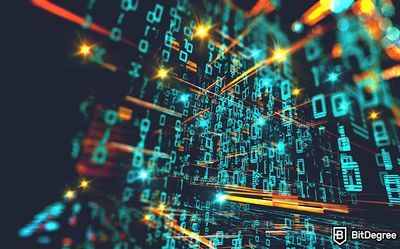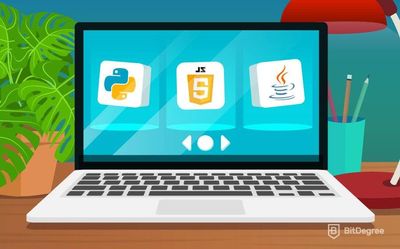 As time goes on, and the IT-centered job market becomes more and more competitive, there’s an increasing amount of people looking for ways of getting into the industry as fast as possible.
As time goes on, and the IT-centered job market becomes more and more competitive, there’s an increasing amount of people looking for ways of getting into the industry as fast as possible.
Questions on how to become a data scientist and how to score a job in the IT industry are quite popular among people who want to get from point A to point B, ASAP. If you’re interested in becoming a data scientist and want to know all of the different data scientist education requirements that you’ll have to meet - great! You’ve come to the right place!
In this article, we'll cover some of the best strategies and tools to find your way into a data science career. As always, feel free to check out our guides to data science courses on platforms like DataCamp, Coursera, and edX.
Table of Contents
Understanding Data Science
Before you start researching how to become a data scientist, let’s lay down some of the basics surrounding the profession. If you’re still contemplating whether or not data scientist career path is the one for you, this brief introduction might sway your decision into one or the other direction.
Latest Deal Active Right Now:
EXCLUSIVE 25% OFF
On DataCamp Subscriptions
Follow the Datacamp promo code link & get an exclusive 25% OFF Datacamp subscriptions. Act now while the offer is still available!
“Data science” is an umbrella term. While it is a career path, there are multiple different “branches” that you might want to choose, depending on your skills and preferences. If we were to define the term itself, data science is concerned with the gathering and analysis of huge chunks of data. These types of scientists usually work in huge corporations that handle vast amounts of data every single day - data scientists are responsible for the “translation” of the incoming data (numbers) into understandable, everyday English.
There are two popular branches of data science that a person looking at how to become a data scientist should know - data analytics and data engineering. Data analysts interpret the data that is presented in front of them and then bring the results back to their employers. Data engineers do the same thing - however, they must also gather the data AND, after they finish analyzing it, come up with a “plan of action” that would be based on the results of their interpretation.
Needless to say, this is a super TL;DR version of the data scientist career path, but you should be able to develop a general idea.
Why Become a Data Scientist?
Even though every single person that wants to get into the field of data science has their reason to do so, some general things could, quite possibly, apply to everyone. First of all, data scientist career path is quite stable with plenty of opportunities to grow and further develop your skills. This is a super important feature for most people out there - if you’re looking for a stable job, you probably want to dedicate yourself to it long-term, and also have an opportunity to keep on learning and growing in the field that you specialize in.
Another huge reason why people look into how to become a data scientist is the salary. There’s a huge amount of people that want to know how to become a data scientist simply because they want to earn the salary of one.
Glassdoor.com estimates that the average annual salary that a data scientist can expect to earn should revolve around the $113,300 mark. This would come out to almost $9442 per month! That’s an amazing salary!

Naturally, the salary that you might make as a data scientist will vary. It all depends on the specific career branch that you might choose, your experience and skill level with data science in general, your geographic residence, an so on. Having said that, it is quite evident that the data scientist's salary is something worth working towards!
What Do You Need to Be a Data Scientist?
When you’re looking for information on how to become a data scientist, there are three main things you need to keep in mind - education, learning path, and experience. If all three of them are in place, you can be certain that you’re on the right path of becoming a data scientist. With that said, let’s take a closer look at each of these points.
Data Scientist Education Requirements
Proper education is probably one of the most important points when you’re thinking about the data scientist career path. And this doesn’t necessarily only concern traditional education, either as you can learn how to become a data scientist without a degree! More and more people every single year are moving away from traditional, formal education institutions and are choosing to learn online. Whether that’s a good or a bad thing is still unknown, but one thing’s for certain - employers now are much more fluid in hiring people that don’t possess any form of traditional education but have acquired their knowledge in some other way. Online courses on platforms like DataCamp and Udacity, articles, tutorials, YouTube videos - the list goes on forever!
The best thing is, most of these online resources are free or low priced. And, even if it so happens, that you have some financial difficulties right now, you can find scholarships for online courses to help you take care of that! Take a look at this tutorial that explains how these small scholarships work.
Whatever your choice of receiving proper education on how to become a data scientist might be, it is still important to have one. The very first thing that you need to do is make sure that such fields like math, computer science and IT, in general, are “in-line” with your hobbies and interests. As a data scientist, you will spend a lot of time working on and with various amounts of technical data and numbers - better make sure that it’s your cup of tea!
[edu-compare id="7,3" type="pros-and-cons"]
Table: Pros and cons of DataCamp VS Udacity
After that’s all said and done, your best bet is to enroll in a field that would be closely related to data science - a bachelor's and master's degree in computer science, physics, maths or any other similar field will do fine. Now, this is probably more of a “motivation-based” point, but do keep in mind that you have to display good results from the very beginning of your studies to be able to score the data scientist career path. It’s a difficult profession that requires a lot of concentration and doesn’t have a lot of space for error - if you work hard from day one of your studies, you’ll increase your chance of actually getting the job afterward, and becoming a true professional in the field.

That being said, if you chose to skip traditional education altogether and just focus on individual learning - don’t worry! While it may be more difficult to get hired, you should still eventually get a job in the field. The only true criteria are for you to be a hard worker that’s also passionate about what he or she does. That's why if you want to be sure on how to become a data scientist without a degree, you have to prep your own learning path.
Learning Path
Becoming a data scientist requires a lot of different information that mainly revolves around data management. BitDegree is one of the few companies that take care of the whole journey of the student and provides a learning path with every detail along the way. While traditional educational systems might not adapt as fast as the technological trends change, by taking following the learning path on BitDegree you will get the full package.
The data scientist roadmap consists of:
- Business analytics. Data science plays a huge role in the business scene. The ones who know how to leverage data to increase the quality of their services are the ones who find the most success.
- Statistics. What is important on how to become a data scientist is to recognize the patterns of statistics. Interpreting information from graphical and numeral summaries can help to make better business decisions.
- Linear Algebra. Being able to read data and statistics is not enough to be successful. By learning about variables, its expressions, numerical expressions, simplifying and evaluating algebraic expressions you will learn how to apply the data knowledge into the real-life situation.
- General Development/Coding Skills. Having at least basic experience with the general coding or developing programming languages makes the employee more likely to be hired by the company. Python is one of the most universal programming languages that is user-friendly and easy to learn, and, additionally, Git is also something that every data scientist has to know.
- Engineering. Database design, building data pipelines, and distributed data systems knowledge are crucial when it comes to how to become a data scientist. These are the processes that bring data together into a database and allows us to process it.
- Machine Learning. This process plays a huge role currently in the field of data science. In this case, data cleaning and manipulation, use-case models, algorithms, model evaluation, and future engineering step it. Machine learning in data science gives so many options to make the data more correct, complete and accurate.
The data scientist learning path consists of 19 chapters and even more courses to learn from. In the list, we mentioned only a few that stand out, and the whole journey can be found here.


- Easy to use with a learn-by-doing approach
- Offers quality content
- Gamified in-browser coding experience
- Free certificates of completion
- Focused on data science skills
- Flexible learning timetable

- High-quality courses
- Nanodegree programs
- Student Career services
- Nanodegree programs
- Suitable for enterprises
- Paid certificates of completion

- A wide range of learning programs
- University-level courses
- Easy to navigate
- University-level courses
- Suitable for enterprises
- Verified certificates of completion
Experience
Finally, if you want to know how to become a data scientist, you should know that a little bit of experience will go a long way. Now, you might think - but what if I’m fresh out of college, and am looking for my first job? Well, to that I say - there are many different ways that you can acquire experience - an official, stable job is just one of them!
Many people are used to associating the term “experience” with the concept of a “job”. That’s doesn’t always have to be the case! You may earn experience with university or college courses, individual projects and simply working on your skills with data science every single day.
[edu-compare id="7,2" type="features"]
Table: Features of DataCamp VS edX
Surely, most employers expect you to provide them with specific results, so it will be beneficial that, while you’re looking for how to become a data scientist, you also spend a good portion of time researching some activities that would also provide certifications or other proof of your time spent doing them.
One thing’s for certain, though - no matter how much time you spend looking for how to become data scientist if you need to also constantly look for different ways to acquire experience.

Did you know?
Have you ever wondered which online learning platforms are the best for your career?
Is Data Science Your Future?
If there’s one thing to take away from this tutorial, it's that data scientist career path requires a lot of hard work and dedication. Whether you’ve just started learning all of the tropes of what it has to offer, or you’re already an experienced data scientist who just needed a little bit of motivation, remember - as long as you work hard and have a clear and strict work etiquette, you shouldn't encounter any problems whatsoever.
All in all, you should now know how to become a data scientist, and why you should do so, in the first place. Make sure to visit our tutorials page and check out our guides, such as the overview of machine learning on DataCamp, for more information!












